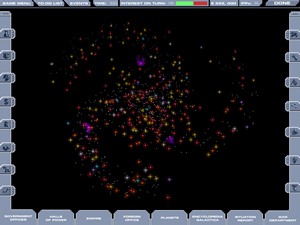Uh-oh, the master is back! Quick…look busy.
Warning! Alan Emrich has a mischievous gleam in his eye. Emrich is the man who (with Tom Hughes) coined the term “4x” (explore, expand, exploit, exterminate) and wrote the legendary strategy guides for Civilization, Master of Orion, and Master of Magic. He has been writing for the computer strategy game industry since it was just a bunch of clever geeks writing code in their parents’ basement and mailing games to fans on 360k floppies.
It is the end of E3 and everyone else is exhausted (except Ben Silverman, who was last seen asking an attractive booth model if he could “put his pickle in her pocket” – don’t ask [And don’t tell… – Ed.]). People are already packing up computers and talking fondly of forgotten luxuries like “sleep.” The booth models have stopped smiling and have given up all pretense of enjoying the slack-jawed conversation of the sweaty, panting virgins still hanging on. The show is over…but not for Alan Emrich.
A nearby PR person grumbles that the throng of people Emrich is hustling in
for yet another demonstration of Master of Orion III does not contain
a single media writer. Emrich replies, “So? They’re fans! We made the game for
them. Let ’em see it.”
He means every word of it. Emrich, author of the four-hundred page design document
that forms the heart of Master of Orion III, is very excited about the
game – and with good reason. MoO III is quickly shaping up to be much
more than a solid sequel to a classic franchise. It is poised to break new ground
and force us to rethink our expectations for 4x strategy games.
That does not mean, however, that MoO III is abandoning its core identity.
You will still start on a tiny planet in the midst of a vast galaxy (and I do
mean vast; the galaxy generator is capable of creating a galaxy with 256 stars,
each star capable of having eight planets and each planet capable of supporting
five moons) and compete with other races in your attempt to develop a sprawling
interstellar realm. You will still research technologies, design ships and build
fleets to send against your neighbors. Your neighbors are still very likely
to deserve it.
Nevertheless, MoO III will play like a very different game from its
predecessors (and from any other turn-based strategy game on the market). The
game’s most innovative feature is likely to be the way gameplay will change
over the course of the game. In traditional 4x games, the player breezes through
the early parts, but a single turn towards the end of the game can take as long
as thirty minutes as the player attempts to micromanage each planet or city.
This makes multiplayer miserable and has put considerable strain on relationships
and careers as addicted players slog through hours of real time just to move
forward a few turns.
Emrich and his colleagues at Quicksilver Software want to change all that.
In MoO III they have introduced the concept of “Imperial Focus Points.”
Each player gets a set number of points that they can use for the next turn.
Those points can be used to design a new type of ship, micromanage a planet’s
build queue, or initiate diplomatic parlays with rival empires. Once those points
are used up, you will have to wait until the next turn to perform any of those
functions. Combined with monetary incentives for shortening your turns, the
focus point system may well make MoO III the first widely popular, turn-based,
multi-player empire game.
Focus Points, however, are about more than speeding up multiplayer. They are
an example of Quicksilver’s overall design philosophy that running a huge bureaucracy
with billions of citizens should be a different experience from running a single
planet. (Emrich takes this seriously enough that he has suggested that MoO
III is actually a “5x” game, because of its focus on a variable gameplay
eXperience.)
In our own world, the mayor of Lynchburg, Tennessee has time to worry about whether or not their town has a pharmacy. The President of the United States does not. Likewise, galactic overlords just do not have time to start every day trying to determine how much food should be grown on every planet of their domain.
That is where the bureaucrats come in. Each planet will have them, at varying levels of efficiency. This is not in itself innovative, but for the first time you will have no choice but to rely on or replace them (just like real galactic overlords!). In addition, as your empire grows you will find that the size of your bureaucracy increases production costs and complicates internal political matters. As you move through the game, more and more of your time will be spent placating and managing your subordinates and negotiating trade agreements with less developed governments who can produce things more cheaply.
You can also spend as much or as little time as you like designing your fleets.
MoO III is intended to adapt to fit your play style. If you enjoy deciding
the size of the thrusters on every ship in your fleet, you can do that. If you
prefer to focus on diplomacy and infrastructure; the game can design fleets
according to the mission parameters you set. Likewise, if you are not a big
fan of managing space battles, they can be automatically resolved without you
having to click and drag a single selection box.
No matter what your style of play, you will want to spend some time with the technology “wheel.” Over the course of the game, you will be able to choose your research from hundreds of technologies divided into six schools. Within each school, advances will be broken down into two areas: theoretical and applied. For example, you may know how nuclear reactions take place, but not know how to build a nuclear power plant. The designers stated quite emphatically that it will be impossible to research everything in the tree, so players will have to pick and choose carefully.
Other tough choices will come into play through the complex diplomacy model
that will be implemented in MoO III. Each rival race will have three
separate diplomatic vocabularies. The one they use with you will be determined
by whether they hate you, like you, or would not care if your entire sector
of space were infested with tribbles and fell into complete disarray. Complex
trades and treaties will be possible, and wise decisions will make it much easier
to take one of the nonviolent paths to victory.
In addition, Master of Orion III brings with it all of the bells and
whistles that you would expect from this venerable series. The built-in encyclopedia
is already vast and growing quickly. The interface is slick and efficient. The
backstory and narrative are richly developed. The graphics, although not 3D
accelerated (a plus, in my opinion) are attractive and fast.
None of these attributes, however, are likely to make MoO III legendary.
If the game actually plays the way the designers promise it will, however, MoO
III may end up staying on your hard drive long after you have installed
your Pentium 9 motherboard.







